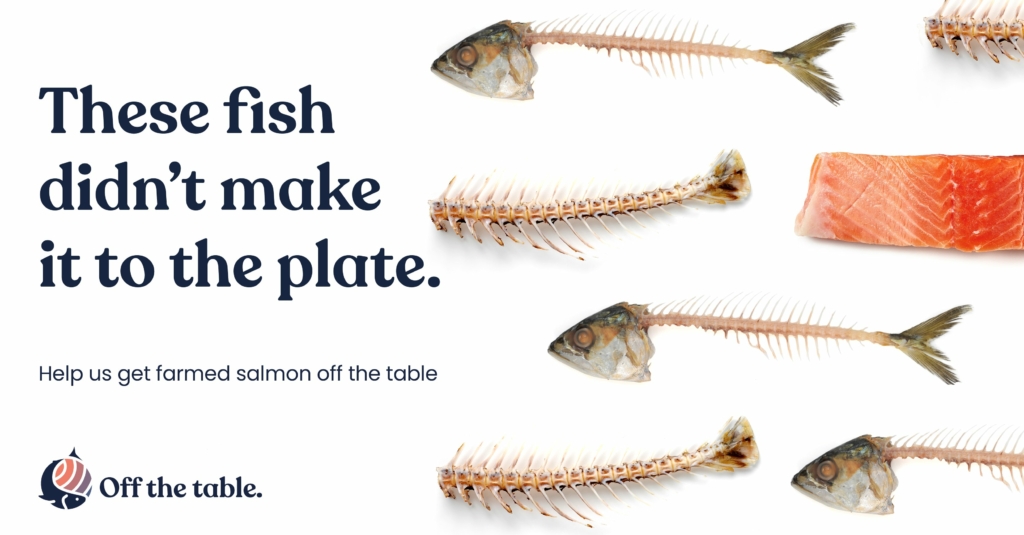Ten Scottish salmon farms reported over 50% mortality in 2023

I recently wrote abut the catastrophe that is salmon farming in Scotland. Here, Neil McRae adds some (horrific) details.
These figures for production losses, which were issued by the industry body Salmon Scotland, give the cumulative mortality on a farm over a full production cycle, as a percentage of the total number of fish which were initially stocked on the farm.
It can be difficult to convert percentages into actual numbers of dead fish, as the initial number stocked is often not available in the public data. However, sometimes it is possible to discern the number of salmon stocked on a site prior to the start of the mass mortality by reading reports of Fish Health Inspectorate (FHI) visits to that site, if any took place. I have used this method for the first four cases listed here, to give some idea of the immensely high numbers involved.
All these mortalities concern farmed Atlantic salmon, managed in offshore marine cages.
It usually takes 2 years to rear salmon to harvest once smolts (which are reared in freshwater), are stocked in the sea pens, however this period is often severely curtailed during a mass mortality event and the survivors are harvested long before they would normally have been.
1. Druimyeon Bay (Isle of Gigha)
Owner: Bakkafrost Scotland
Production losses: 82.3%
Source: https://www.salmonscotland.co.uk/reports/monthly-mortality-rate-august-2023
It is very difficult to be sure just how many fish died in this catastrophe, as the available public-domain databases do not state how many smolts the farm was initially stocked with; only the company themselves have that information. However, page 3 of the report of a routine FHI visit on 17.8.22 clearly states that there were 887,945 salmon on-site on that date, plus 19,500 wrasse ‘cleaner fish’ (which are put there to ‘clean’ the sea lice off the salmon). This was fairly shortly after the pens were stocked in June of that year. 82.3% of 887,945 salmon is 730,778 dead salmon1. (Numbers of dead wrasse are not recorded).
Source for numbers of fish on-site on 17.8.2022, FHI case no. 2022-0362 (go to page 149 of pdf):
The true mortality number would be even higher than this, as the FHI report makes it clear that there had already been significant mortalities by the time of the 17.08.2022 inspection.
2. Loch Carnan (North Uist)
Owner: Loch Duart Ltd
Production losses: 76.8%
Given that FHI report 2022-01151 states that there were 349,167 salmon on site on 26/4/22 before the mass mortality started, a production loss of 76.8% would be equivalent to 268,160 dead fish. However, the true number will be significantly higher than this as the farm was stocked in September 2021 and the monthly mortality rate figures2 for that month show that there was a high (12.8%) mortality at the time of transferring the smolts to the pens; this means that the number of salmon on-site on 26/4/22 was significantly lower than the initial stocking rate.
Sources:
https://www.salmonscotland.co.uk/reports/monthly-mortality-rate-may-2023
https://www.salmonscotland.co.uk/reports/monthly-mortality-rate-september-2021
3. Easter Score Holms (Shetland)
Owner: Scottish Sea Farms
Production losses: 57.6%
FHI inspection report 2022-0529 states that there were 777,798 fish on-site on 26/10/22, shortly after the farm was stocked in September and before the mass mortalities began; a production loss of 57.6% would be equivalent to 448,000 dead fish.
Sources:
https://www.salmonscotland.co.uk/reports/monthly-mortality-rate-september-2023
4. Dunstaffnage, by Oban
Owner: Scottish Sea Farms
Production losses: 56.5%
An FHI inspection (No. 2022-0226) on 29/06/22, soon after the site was stocked in May) states that there were 667,065 fish on site on that date, so the above percentage would be equivalent to 376,890 dead fish.
Sources:
https://www.salmonscotland.co.uk/reports/monthly-mortality-rate-july-2023
(go to p6)
5. Greanamul (Benbecula)
Owner: Bakkafrost
Note: Greanamul is an ASC (Aquaculture Stewardship Council) certified site.
Production losses: 56.4%
It is not possible to estimate the total number of dead fish here, as the number of fish on-site prior to the mass mortality cannot be ascertained.
Source:
https://www.salmonscotland.co.uk/reports/monthly-mortality-rate-august-2023
6. Setter Voe (Shetland)
Owner: Scottish Sea Farms
Production losses: 51.9%
Source:
https://www.salmonscotland.co.uk/reports/monthly-mortality-rate-september-2023
7. Stulaigh (South Uist)
Owner: Mowi Scotland Ltd
Note: Stulaigh is an ASC-certified site.
Production losses: 51.7%
Source:
https://www.salmonscotland.co.uk/reports/monthly-mortality-rate-may-2023
8. Hellisay (Barra)
Owner: Mowi
Production losses: 51.5%
Source:
https://www.salmonscotland.co.uk/reports/monthly-mortality-rate-november-2023
9. Lamlash (Isle of Arran)
Owner: Bakkafrost
Note: Lamlash is an ASC-certified site.
Production losses: 50.9%
Source:
https://www.salmonscotland.co.uk/reports/monthly-mortality-rate-september-2023
10. Poll na Gille (Loch Melfort)
Owner: Mowi
Note: this is an ASC-certified site.
Production losses: 50.4%
Source: https://www.salmonscotland.co.uk/reports/monthly-mortality-rate-october-2023
Neil McRae BVM&S, MRCVS 20th August 2024

Ok , some big numbers, do we know why such high mortality, and is there a solution
SImply, that any kind of mono-culture is anti-thesis to evolutionary biology, and is thus vulnerable to breaking’ usually by disease in this case; accompanied by warming oceans; mono-cultures are always unsustainable in energy and resource terms, and only occurs at all because of a human construct called money. The solution is for people to stop buying this stuff, then the businesses will go away, and these kind of mass mortality events will then also go away.
Additionally if we stop polluting our environment, then the fish populations may return naturally to pre-6th mass extinction levels so everyone left who fancies a fish can then go and catch their own. But don’t expect that to happen for 1000s of years.
Given the amount of crap dumped in the oceans, especially after Fukashima, not to mention the horrors of farming any livestock, I’m quite stunned that anyone is still actually choosing to eat any kind of seafood these days!